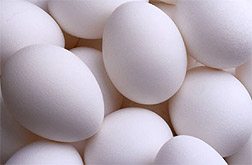
What’s the matter with boiled eggs? It looks like one egg should be as good as another, right? So what makes them different?
You put a pot of water on to boil. When it finally reaches a boil, you add some ordinary chicken eggs to make egg custard, deviled eggs, egg salad, or just individual “hen fruits” to munch on with a free sprinkling of sea salt and a little cracked pepper. But…
Problem Peeling Boiled Eggs?
You experience a problem when you go to peel them. Why don’t your boiled eggs peel right? In fact, sometimes they do, and sometimes they don’t. Why not every time?
Anatomy of an Egg
Within the eggshell lies more than just a white and a yolk. Between the white and the shell is a thin membrane, which is rich in keratin—the protein of fingernails, hair, and horns.
This keratinous membrane forms a strong bond to the egg white in a boiled egg, if it is fresh. A fresh egg white possesses a lower pH (higher acidity) than does the egg white of an egg that is not quite so fresh. As the egg ages, the pH rises and the bond between membrane and white weakens.
Fresh Isn’t Always Best
This means the shell and membrane are more easily removed from the egg—it is easier to peel. A greatly increased number of eggs that are just a bit older, but within the realm of healthy and moderately fresh, will peel just as you want them. So the solution to the peeling problem is allowing just the right amount of aging.
One Final Suggestion
The well-known culinary television program Masterchef Junior, in season 4, recommends eggs be peeled under water. It was claimed that water helps separate the membrane from the egg. So if you are stuck with eggs, some of them fresh and some of them not so fresh, you might apply this recommendation.
Note: You might also enjoy Chemicals to Peel Tomatoes?
References:

Love the “hen fruit” reference.
FYI the reason Europe does not refrigerate eggs is because they don’t wash them. Therefore the protective film that discourages salmonella is still intact. We wash our eggs in USA so must refrigerate.
Boil fresh eggs with baking soda in the water it penetrates the shell, reacts with the low pH membrane, raises the pH and the fresh eggs peel much better; maybe not quite as good as aged (2 to 3 week old) eggs.
Storing eggs for a long time is not a problem they hold up with minimal deterioration after 8 months, when refrigerated below 40 degrees. This from ongoing investigation, for the best way for small flock owners to store the surplus eggs of spring for the wintertime dirth, by Mother Earth News.
I just recently learned that in England and Australia, and likely Europe eggs are rarely refrigerated, just put on the shelf in the pantry; for an average stay of what length I did not ascertain from the article.
Wasn’t so long ago (1930’s) that eggs were not available year round. It was only after finding out that daylight length was what stimulated chickens and birds to begin laying eggs come spring, and by using artificial light to stimulate the pituitary you could induce chickens to lay eggs year round, though still it waas less than in spring when it is their nature to begin laying eggs to incubate and reproduce.
Providing artificial light was not practical until the advent of rural electrification (30’s and 40’s), by rural electric co-ops (member owned utility companies which still provide the bulk of electricity to rural areas today) that were funded in part by Depression-era government funding (also still available), thru the REA Rural Electric Assoc. Most chickens in “modern” caged “egg factories” never see the real light of day; i.e. sunlight.
Prior to year-long egg production, spring eggs were stored for year end use and holiday baking by putting them submerged in a crock filled with waterglass, a solution of potassium silicate and water. This was to exclude the air which would cause eggs to break down (putrify) and dry out over time as egg shells are porous and eggs are alive and biologically active if fertilized by a rooster. Quality did degrade over time but they still could be stored with no ongoing energy input required with refrigeration. I could go on but I am sure you have heard quite a bit more than you bargained for. That’s the problem of being a tangentially challenged “know it all”.
Once I had no access to a complete kitchen and had to store my eggs without the benefit of refrigeration. From that I discerned a week on the shelf was perfectly alright, though now they are advising the consumer to be careful! Presumably against salmonella.
As to “waterglass”, yes I am familiar with that, although I had thought they used sodium metasilicate. I don’t see why both shouldn’t work, sealing shell pores. A practice in the south, possibly elsewhere, that grosses me out is putting eggs, uncooked (am I wrong here?) in a concoction containing vinegar, which denatures the white, in imitation of cooking. I want MY eggs cooked, not pickled!
I knew older eggs were supposed to be easier to peel, but didn’t know the reason. But I just boil the eggs I have on hand. I’m going to peel eggs under running water next time to see if that helps.